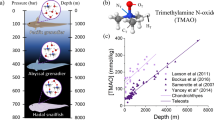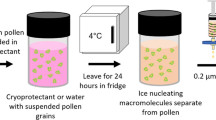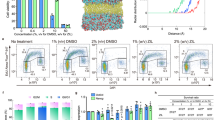Abstract
PYRIDINE, like dimethyl sulphide, forms a high-boiling, water-soluble oxide, pyridine N-oxide (PNO). It was surmised that PNO might protect living cells against freezing damage in the same way as dimethyl sulphoxide1 and some other aliphatic compounds2. The particular interest attached to PNO is that it would be the first aromatic compound to be used in this connexion.
This is a preview of subscription content, access via your institution
Access options
Subscribe to this journal
Receive 51 print issues and online access
$199.00 per year
only $3.90 per issue
Buy this article
- Purchase on Springer Link
- Instant access to full article PDF
Prices may be subject to local taxes which are calculated during checkout
Similar content being viewed by others
References
Lovelock, J. E., and Bishop, M. W. H., Nature, 183, 1394 (1959).
Lovelock, J. E., Biochem. J., 56, 265 (1954).
Williams, R. T., Detoxication Mechanisms, 561 (Chapman and Hall, London, 1959).
Author information
Authors and Affiliations
Rights and permissions
About this article
Cite this article
NASH, T. Prevention of Freezing Damage to Living Cells by Pyridine N-Oxide. Nature 192, 360–361 (1961). https://doi.org/10.1038/192360c0
Issue Date:
DOI: https://doi.org/10.1038/192360c0
This article is cited by
-
Die Gefrier-Fixation lebender Zellen und ihre Anwendung in der Elektronenmikroskopie
Zeitschrift f�r Zellforschung und Mikroskopische Anatomie (1964)
-
Similar Effects of Various Neutral Solutes on the Survival of Aerobacter aerogenes and of Red Blood Cells after Freezing and Thawing
Nature (1963)
Comments
By submitting a comment you agree to abide by our Terms and Community Guidelines. If you find something abusive or that does not comply with our terms or guidelines please flag it as inappropriate.



